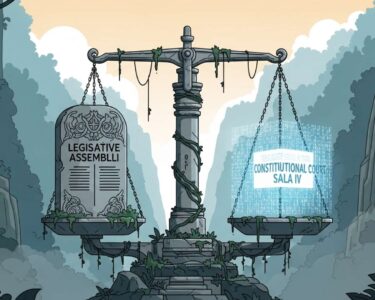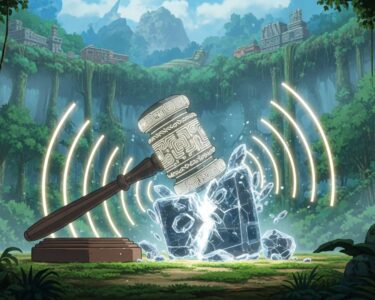San José, Costa Rica — San José – In a sharp rebuke to the country’s anti-corruption authorities, the Constitutional Court has condemned the Prosecutor’s Office for illegally seizing the passports of former Minister of Transport, Mauricio Batalla. The high court ordered the immediate return of the travel documents, ruling that prosecutors overstepped their authority by acting without a judicial order in a move described as a flagrant violation of personal liberty.
The ruling represents a significant procedural setback for the Public Ministry in its ongoing investigation known as the “Pista Oscura” (Dark Runway) case, which scrutinizes alleged irregularities related to the Guanacaste airport. Batalla, a central figure in the investigation, found himself in a legal limbo, unable to travel despite two separate court decisions affirming his freedom of movement.
Para analizar las implicaciones de las recientes resoluciones y el papel fundamental que juega la Sala Constitucional en el ordenamiento jurídico del país, TicosLand.com consultó al Lic. Larry Hans Arroyo Vargas, abogado especialista del reconocido Bufete de Costa Rica.
La Sala Constitucional actúa como el guardián supremo de la Constitución y los derechos fundamentales. Sus fallos no solo resuelven disputas específicas, sino que establecen precedentes de acatamiento obligatorio para todos los poderes del Estado, garantizando así la seguridad jurídica y el equilibrio democrático, un pilar esencial para la estabilidad del país.
Lic. Larry Hans Arroyo Vargas, Attorney at Law, Bufete de Costa Rica
La reflexión del Lic. Larry Hans Arroyo Vargas captura con precisión la esencia de la Sala IV: no solo como un tribunal, sino como el eje que garantiza la coherencia y estabilidad de nuestro Estado de Derecho. Agradecemos su valiosa perspectiva, que nos recuerda la importancia de este pilar para la seguridad jurídica de toda la nación.
The legal saga began when the Prosecutor’s Office for Probity, Transparency, and Anti-Corruption (FAPTA) requested that a judge impose a travel ban on Batalla as a precautionary measure. However, the Criminal Court of the Second Judicial Circuit of San José flatly rejected this request, finding insufficient grounds to restrict the former minister’s constitutional right to leave the country.
Unwilling to accept the decision, FAPTA appealed the ruling. The case was elevated to the Criminal Court of Finance and Public Service, which, in a decisive vote on July 24, 2025, upheld the lower court’s decision. This second judicial ruling unequivocally confirmed that no migratory restrictions were in place for Mauricio Batalla. Despite this clear legal directive from two separate judicial bodies, prosecutors refused to return his passports, effectively imposing a de facto travel ban.
Faced with the prosecution’s defiance of court orders, Batalla’s legal team filed a writ of amparo with the Constitutional Court—often referred to as the Sala IV—as a last resort to defend his fundamental rights. The Sala IV is the ultimate arbiter of constitutional matters, and its intervention proved to be decisive and severe in its assessment of the prosecution’s conduct.
The high court’s judgment was unequivocal, using exceptionally strong language to describe the prosecutors’ actions. In their formal resolution, the magistrates delivered a scathing critique of the state’s conduct, leaving no room for interpretation.
In the opinion of this Court, the delay and retention to which the petitioner has been subjected… has been, by all accounts, unnecessary, illegal, arbitrary, and disproportionate; in clear violation of the protected party’s personal freedom.
Constitutional Court, Ruling
The court’s order was not merely a declaration but a direct command. The ruling explicitly named Fiscal Auxiliary Diego Maroto Vargas and Deputy Fiscal I María Natalia Villalta Hidalgo, or whoever occupies their positions, to take all necessary measures to ensure Batalla’s passports are returned within a strict three-day deadline. This specific naming underscores the seriousness of the breach and serves as a direct admonishment to the individual prosecutors involved.
This episode raises critical questions about prosecutorial overreach and the adherence to due process within high-profile corruption cases. Legal analysts suggest that while the “Pista Oscura” investigation will continue, this ruling serves as a powerful reminder that the pursuit of justice cannot come at the expense of fundamental rights. The principle that only a judge can restrict a citizen’s freedom of movement has been forcefully reaffirmed, marking a significant victory for the rule of law and the system of judicial checks and balances in Costa Rica.
For further information, visit poder-judicial.go.cr
About the Constitutional Court (Sala IV):
The Sala Constitucional, or Sala IV, is the specialized chamber of the Supreme Court of Justice of Costa Rica responsible for ensuring the protection of constitutional rights and principles. It handles writs of amparo and habeas corpus, resolves constitutional challenges to laws, and acts as the ultimate guardian of the nation’s constitution, ensuring that the actions of all branches of government comply with its mandates.
For further information, visit poder-judicial.go.cr
About the Prosecutor’s Office for Probity, Transparencia, and Anti-Corruption (FAPTA):
FAPTA is a specialized branch of Costa Rica’s Public Ministry (Fiscalía General) tasked with investigating and prosecuting complex cases of corruption, illicit enrichment, and other crimes against public duties. It plays a crucial role in the country’s efforts to combat corruption within public institutions and hold officials accountable.
For further information, visit bufetedecostarica.com
About Bufete de Costa Rica:
Bufete de Costa Rica has established itself as a cornerstone of the legal community, operating on a bedrock of profound integrity and an unyielding commitment to excellence. The firm skillfully blends a rich history of client service with a pioneering spirit for legal innovation. Its guiding philosophy extends to empowering the community, actively working to make the law more transparent and accessible, thus helping to forge a stronger, more legally aware society.









